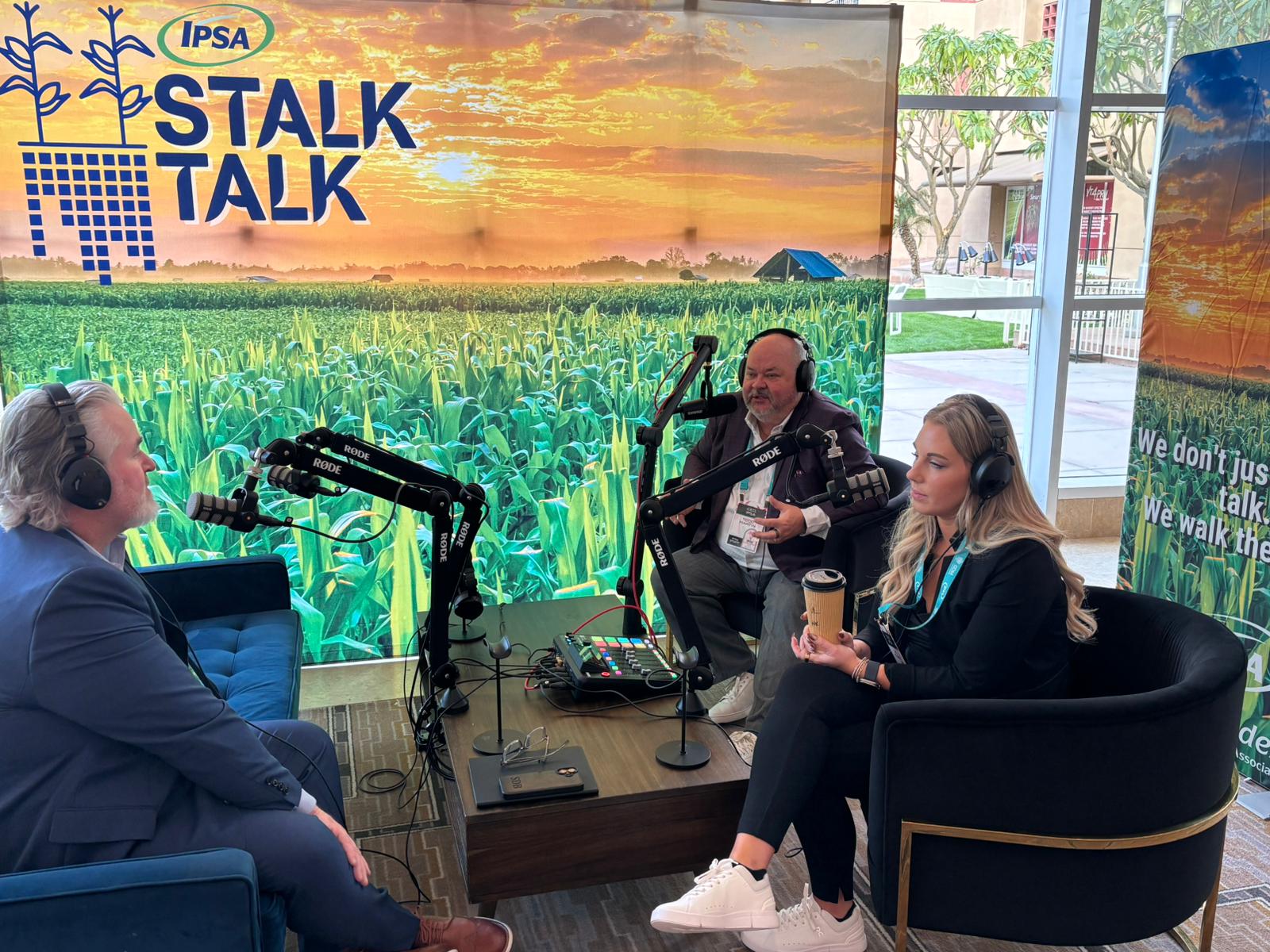And we’re rolling! The Independent Professional Seed Association (IPSA) has officially kicked off its 36th Annual Conference in sunny Palm Springs, California as of noon Tuesday, following a successful Greenleaf Winterfest that preceded it. This year’s event exceeded attendance expectations with an impressive 475 registrations including sponsors, tradeshow exhibitors, regular seed company members, and numerous service providers supporting the seed sector.
“This is our largest conference that we’ve ever had in person,” said IPSA’s COO Cat Frans. “What’s driving that? I think it’s the value that IPSA brings to the members that come here. A huge portion of that is the relationships they create and nurture while they’re here. Our group is so tight-knit—it’s really like a coming together of friends.”
Highlights from Today
The day started with Greenleaf Winterfest for GLG licensees and partners, following the lively “Shots in the Dark” Winterfest event last night. At noon, the event transitioned to IPSA’s scheduling. IPSA’s speaker lineup, always a highlight of the conference, proved as strong as ever.
“It’s not hard to convince people to attend the sessions because the lineup of speakers is phenomenal,” Frans notes.
This year’s conference theme, “Forward”, reflects a focus on innovation and progress in the face of past and present industry challenges. Frans explains, “We all know we’ve had storm clouds behind us as an industry, and we’ve got a few ahead of us, but what we’re focused on is moving forward and trying to be innovative in doing so. A lot of our sessions are talking about innovation for independent seed companies.”
Today’s opening session featured two highly anticipated keynotes.
Keynote 1: Chris Voss, former FBI hostage negotiator and CEO of The Black Swan Group
Voss kicked things off with an in-depth presentation on the art of negotiation. “I believe the world’s problems are going to be ultimately solved by private companies, not governments, so it’s in my interest that you become better negotiators,” Voss said.
It’s no surprise that negotiation is a critical skill in any business, including for independent seed companies navigating complex markets. That said, Voss explained that negotiation is about much more than winning the deal; it’s about establishing deeper, more meaningful connection. “You’ll enjoy life that much more across the board, and you’ll be more successful as a businessperson and happier in your family by being able to establish deeper connections,” he said.
So, how to negotiate like a crack FBI negotiator? It comes down to understanding human nature, which likely means dramatically shifting your negotiating strategy. One recommendation among several Voss outlined focused on the ‘yes’ versus ‘no’ dichotomy. As humans, we feel comfort and safety in the word ‘no’. In sales, however, we typically push for ‘yes’. That disconnect can get in the way of achieving the deal, confirming the partnership, or winning the argument.
The solution to adding comfort and achieving a negotiating goal is to work with human nature by reframing questions from seeking ‘yes’ to prioritizing the ‘no’.
Does it work? Absolutely, said Voss. One of his presentation’s many examples goes like this: During the second Obama election, the Republican fundraising committee ran, as always, dialing for dollars efforts. Typically, a fundraising script is three questions – three questions the potential donor should say yes to – before the fundraising ask. On the conventional fundraising script, the first question would be something along the lines of: “Do you want to see the Republicans back in the White House?” Hearing about Voss’ “seek the ‘no’” concept, one phone campaign ran a side-by-side comparison. Half the callers used the typical ‘yes’-based script; the others used a question that sought a ‘no’ answer, specifically: “Have you given up on taking the White House back in November?” The ‘no’ script generated a 23% higher success rate in terms of fundraising dollars.
It’s a concept Voss said can be used in every facet of daily work and personal life.
This summary is just a tiny taste of an in-depth and fascinating presentation by a masterful negotiator and skilled presenter. That IPSA was able to bring in such a high-caliber speaker is evidence of the organization’s commitment to supporting the learning and success of its members.
Keynote 2: David Friedberg, CEO and co-founder of Ohalo Genetics
#IPSA2025’s second keynote speaker was David Friedberg, CEO and co-founder of Ohalo Genetics, joined onstage for a chat-style discussion by outgoing IPSA President Colin Steen. Friedberg is widely regarded as one of the most creative thinkers in crop innovation today.
“Having him speak is a big win for IPSA,” Frans said.
Not surprisingly, the discussion was wide-reaching (should Canada become the 51st state?), future-focused (will we grow plants on Mars?) and mind-expanding (disruption is coming at every level).
Does Friedberg foresee creating plants that don’t even exist now, ideally designed for specific environments?
His short answer: absolutely. Technology already exists to provide a computer program with specific parameters — the physical growing characteristics, soil nutrient analysis, weather conditions, location, sunlight hours, etc. — and software can design an optimal plant.
“CRISPR-Cas9 came out a dozen years ago,” he said. “Today, there are hundreds of alternatives, hundreds. Many of them are open source, free, available, public in the public realm. And now software is creating entirely new proteins that can do gene construction and gene editing from scratch. We used to find them in nature. Now we’re actually making them on a computer, printing them, and then making those become our new writing tool for the genome. So, all of that tooling is here today, or is on the right [path]; all of the software to analyze genomes and understand the phenotypic outcomes of the genomes and then make the predictions on what I’d need is here today… We’re not going to take traditional plants to Mars. I think we’re going to use bioengineering to design new plants.”
Friedberg said one thing is absolutely certain: disruption is ahead, even in areas we might be lulled into thinking are untouchable. He pointed to Google, which had a near-monopoly and seemed infallible, very abruptly being outpaced in the technological race by ChatGPT.
“I think the same will happen in ag. The reason I’m running Ohalo is I think we can really disrupt how things are done.”
That may, in the near future, include in the corn market. It’s well-known that Ohalo has been working on corn alongside its more public potato efforts. Friedberg said he doesn’t yet have an answer on timelines for Ohalo to make corn-specific announcements. “Hopefully that time is not too far off,” he said. “There’s a couple things we really have to nail before we can talk to you about timelines for corn.”
Alongside Ohalo, Friedberg is also one of the four cofounders and presenters on the ‘All In’ podcast, which started from a grassroots conversation — literally a Zoom call between friends — and is now among the top 10 podcasts in the country. It was also the first podcast to host President-elect Donald Trump.
Kudos to IPSA for bringing Friedberg to the IPSA stage. His is a voice highly worth listening to and one who will surely provide deep food for thought to the #IPSA2025 audience long into the future.
A Meeting of Friends
The biggest single reason to attend IPSA is connection: new partnerships made, relationships solidified, ideas exchanged. The independent seed sector is a small world with oversized impact, made possible by people with deep, deep passion for their work and a shared commitment to progress. Onwards to Day 2!











